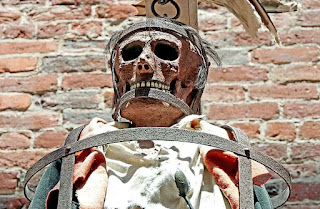When Nazi troops invaded the Soviet Union in June 1941, 18-year-old Zoya Kosmodemyanskaya promptly dropped out of school to join a guerilla band of Soviet resistance fighters
When Nazi troops invaded the Soviet Union in June 1941, 18-year-old Zoya Kosmodemyanskaya promptly dropped out of school to join a guerilla band of Soviet resistance fighters
When Nazi troops invaded the Soviet Union in June 1941, 18-year-old Zoya Kosmodemyanskaya promptly dropped out of school to join a guerilla band of Soviet resistance fighters. She cut Nazi telephone wires, fired on Nazi troop quarters, and destroyed a Nazi stable before German troops captured her. Though subjected to intense torture, she refused to name any of her fellow guerillas, answering her interrogator's questions with replies like "No, I don't know," or "I won't tell you." And even when the Nazi troops dragged her to the gallows, Kosmodemyanskaya urged her countrymen to: "Be brave, fight, beat the Germans, burn, wipe them out
Zoya Anatolyevna Kosmodemyanskaya September 13, 1923 – November 29, 1941) was a Soviet partisan. She was executed after acts of sabotage against the invading armies of Nazi Germany; after stories emerged of her defiance towards her captors, she was posthumously declared a Hero of the Soviet Union. She became one of the most revered heroines of the Soviet Union.
Kosmodemyanskaya joined the Komsomol in 1938. In October 1941, still a high school student in Moscow, she volunteered for a partisan unit. During the course of her army service, she idealized Tatiana Solomakha, a Red Army soldier who was tortured and killed during the course of the Russian Civil War. She was assigned to the partisan unit 9903 (Staff of the Western Front). At the village of Obukhovo near Naro-Fominsk, Kosmodemyanskaya and other partisans crossed the front line and entered territory occupied by the Germans. They mined roads and cut communication lines.
On November 27, 1941, Kosmodemyanskaya received an assignment to burn the village of Petrishchevo, where a German cavalry regiment was stationed. Together with fellow partisans Boris Krainov and Vasily Klubkov, she set fire to three houses in the village.
The partisans believed that one of the houses was being used as a German communications center and that occupying forces were using others for accommodation. The writer A. Zhovtis has disputed these claims, arguing that officially Petrishchevo was not a point of permanent deployment of German troops. However, the villagers said that virtually all the houses of the village were used for accommodation by the German troops transported along the main roads near the village.
After the first attempt at arson, Krainov did not wait for Kosmodemyanskaya and Klubkov at the agreed meeting place and left, returning to his own. Later, Klubkov was also captured by the Germans. Kosmodemyanskaya, having missed her comrades and left alone, decided to return to Petrishchevo and continue the arson campaign. However, the German military authorities in the village had by then organized a gathering of local residents, forming a militia in order to avoid further arson. After being arrested, Kosmodemyanskaya was stripped, beaten, interrogated and tortured with 200 lashes and her body burnt, but refused to give any information. The following morning she was marched to the center of the village with a board around her neck bearing the inscription 'Houseburner' and hanged.
According to Soviet accounts, final words were:
Hey, comrades! Why are you looking so sad? Be brave, fight, beat the Germans, burn, wipe them out! I'm not afraid to die, comrades. It is happiness to die for one's people!
and to the Germans:
You hang me now, but I'm not alone. There are two hundred million of us. You can't hang us all. They will avenge me.
in the Soviet accounts, before the moment of hanging, with the rope on her neck, she said
Farewell, comrades! Fight, do not be afraid! Stalin is with us! Stalin will come!
The Germans left her body hanging on the gallows for several weeks. One of her breasts was cut off by a drunk German near Christmas Eve, and her body desecrated by Germans or collaborators.

.jpeg)
.png)

Comments
Post a Comment